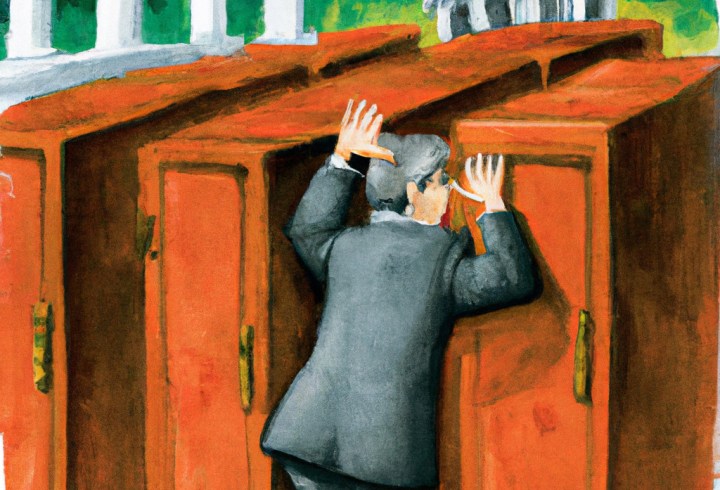GROUNDUP LAW ANALYSIS
South African government officials cannot simply hide behind the sub judice rule

It’s not an excuse for failing to answer difficult or embarrassing questions.
The sub judice rule is often used by politicians as a legal justification for their refusal to answer difficult questions, in Parliament and in public. It has also been relied upon by private people and by Parliament (with increasing frequency) to block or stifle debates about important issues.
But what does the rule actually say? In this article, we explain what the sub judice rule says and when the rule will apply.
What is the sub judice rule?
Sub judice roughly translates as “before a court” or “under a judge”.
Broadly, the rule says that under certain conditions, the publication of a statement or information concerning pending or ongoing court proceedings may be unlawful. When someone breaches the rule, a newspaper editor, for instance, they can technically be prosecuted for contempt of court.
It is not clear whether it is necessary to show whether the rule was breached intentionally or not; for example, whether or not an editor who neglects to take proper steps to ensure an article does not breach the sub judice rule can be prosecuted for contempt of court.
The sub judice rule only applies to “ongoing” and “pending” legal proceedings. This means that the rule does not apply to finalised legal proceedings where a final judgment has been given and all appeals have been exhausted. Similarly, it does not apply to cases that have not started, for example where someone has been investigated but has not been arrested or charged, or where court papers have not yet been filed.
There do not appear to be any cases of anyone being prosecuted for breaching the sub judice rule in recent years.
The basic idea behind the rule is that statements or opinions about ongoing legal proceedings could influence a judge to decide a case in a particular way or lead to a “trial by media”.
But this argument is not that convincing in South Africa, because judges are generally unlikely to decide cases based on publicity about a case. It only makes sense in a country with a jury system, such as the US, where lay people are more likely to be influenced by publicity about a case. Also, it is generally accepted that judges in any high-profile case cannot be expected to be completely immune from what they may read in the newspapers or hear on the radio.
The apartheid rule
Placing restrictions on the ability of the media or the public to discuss ongoing or pending cases could undermine their constitutional right to freedom of expression and to information and ideas.
This occurred during apartheid when the courts applied the sub judice rule strictly. According to the strict test applicable at that time, the sub judice rule would be breached when a publication or statement “might” have influenced the outcome of a case.
Visit Daily Maverick’s home page for more news, analysis and investigations
This strict test often led to abuse. For example, Barend van Niekerk, a Wits law professor, was convicted of contempt of court for breaching the sub judice rule after publicly stating that judges should disregard evidence that may have been obtained through torture in an ongoing political trial under the Terrorism Act.
The new test
Fortunately, the Supreme Court of Appeal created a new test for sub judice in 2007, which is far more lenient and more consistent with the right to freedom of expression.
The new test says the sub judice rule will only be breached when publishing information or statements about an ongoing or pending case create a “real risk” that “demonstrable and substantial” prejudice will be caused to the administration of justice. Even when this can be shown, the sub judice rule will not necessarily have been breached. This is because it is also necessary to show that the harm that the publication of the information has caused to the administration of justice is greater than the harm that would be caused by limiting the free flow of information and ideas.
In the same case, the Supreme Court of Appeal also made it clear that conjecture or speculation about potential prejudice is not sufficient. Proper and reliable evidence must be provided before a court will accept that the publication of information or statements about a court case has created a real and substantial risk to the administration of justice.
In practice, this new test for sub judice means that very few publications of information or statements breach the sub judice rule.
However, there are limited and specific circumstances where statements, or the disclosure of information, about pending or ongoing legal proceedings, could violate the rule.
For example, the sub judice rule may be more likely to be breached when innocent third parties could be put at risk. For instance, publishing the identity of witnesses in a criminal case could place their lives at risk or place them at risk of being intimidated.
But the new test for sub judice also makes it clear politicians cannot refuse to answer difficult questions simply because the questions may relate to ongoing legal proceedings. This is because the sub judice rule does not prohibit, or prevent, discussions about legal proceedings from taking place.
For sub judice to apply, it would be necessary for politicians to show that their answer would create a “real risk” that “demonstrable and substantial prejudice” would be caused to the administration of justice, were they to answer the question. In the vast majority of cases, it is unlikely that politicians would be able to show this.
In other words, answering a question about pending or ongoing legal proceedings will not breach the sub judice rule, and the rule should not be invoked just to avoid answering a question which is embarrassing or difficult. DM
First published by GroundUp.





















 Become an Insider
Become an Insider
Coupled with this is the frequently incorrectly used phrase: “innocent until proved guilty” which does not apply to any situation outside an ongoing criminal trial.